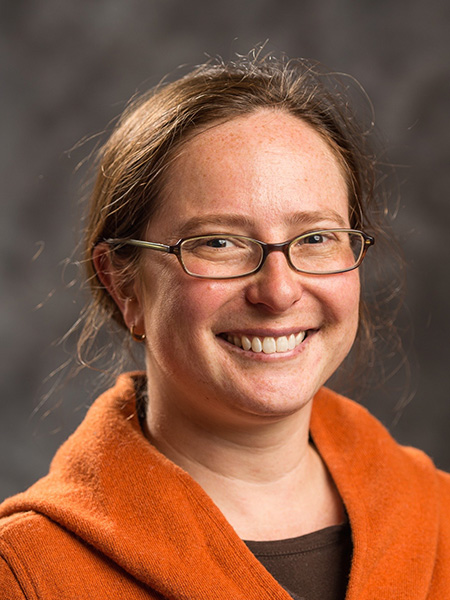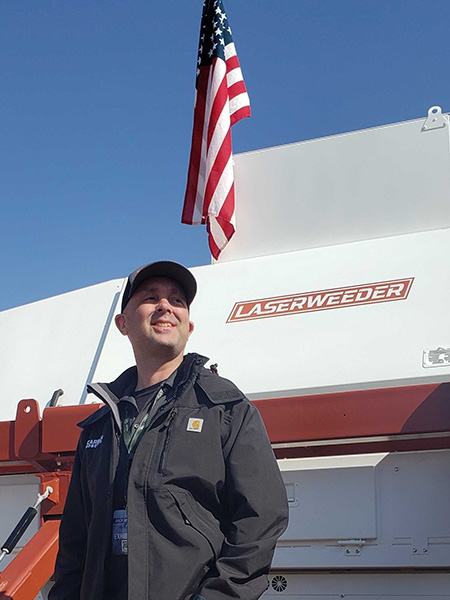The Allen School has selected Janet Davis and Paul Mikesell as the 2023 recipients of its Alumni Impact Award, which recognizes former students who have made significant contributions to the field of computing. Davis and Mikesell will be formally honored during the Allen School’s graduation celebration on June 9 — demonstrating for a new class of alumni what can be achieved with an Allen School education.
Janet Davis (Ph.D., ‘06) shares “joy in making things” while teaching the next generation
Janet Davis’ path to earning her doctorate wasn’t straightforward. She changed research areas more than once, and got a taste of what it was like to be in front of a classroom giving a lecture, rather than behind a desk listening to one. Her first experience teaching didn’t go as planned. She discovered, she said, how her skills could evolve.
“But I had a growth mindset,” Davis said. “If I was going to teach, I wanted to learn how to teach well, and I knew that with practice I could improve.”
It was a mindset that served her well during the remainder of her time at the University of Washington. She took a seminar on computer science education, registered for classes in undergraduate education, participated in several teaching workshops and continued to pursue teaching assistant opportunities when they appeared. When she graduated in 2006, she was familiar with several areas of study and felt more comfortable planning a class. So much so, that she decided she’d make a career out of teaching.
“My time at UW was a challenging and transformative experience that cemented my commitment to undergraduate education,” she said. “Now it is tremendous fun to learn alongside my students.”
The 2023 Alumni Impact Award honoree continues to make a difference both in the classroom and beyond. She was recently awarded full professorship at Whitman College, where she created the institution’s computer science program. Before joining the liberal arts college in Walla Walla, Washington, she spent nine years teaching at Grinnell College in Iowa, honing her craft and preparing for a life dedicated to passing along knowledge to the next generation.
“Janet is a true leader who embodies the character of Whitman College,” said professor Ed Lazowksa, the Bill & Melinda Gates Chair Emeritus at the Allen School. “When Whitman’s leadership approached me with the idea of launching a computer science program in 2012, I knew just the person who could build something really special.”
Professor emeritus Alan Borning, Davis’ co-advisor during her time at UW, agreed. Borning recalled her enthusiasm participating in a reading group on the social aspects of informatics that he and her other co-advisor, Batya Friedman, led. It was a hint of what was to come.
“Janet has been a real leader in computer science education, particularly in liberal arts colleges,” Borning said, “and has been exceptionally effective in combining top-rate teaching with undergraduate research.”
Davis has taken the idea of a liberal arts education to heart, while combining it with her love for computer science and problem solving. At Whitman, for instance, students declare a major during their second year. It’s at that time that Davis asks the deep questions, prompting students to think more about a calling rather than just a career.
“Some students talk about career prospects, and I encourage them to think twice about whether taking CS courses is how they want to spend the rest of their time at Whitman,” she said. “Others talk about their delight in solving puzzles, their triumphs over difficult problems or their hope for making a difference in the world. Those students make my day. But the ones with whom I feel a special sympathy are those who share their joy in making things.”
Davis shares her “joy in making things” across the liberal arts landscape. She’s a member of the Liberal Arts Computer Science Consortium (LACS), a co-leader of the SIGCSE Committee on Computing Education in Liberal Arts Colleges (SIGCSE-LAC) and a member of the Computing Research Association’s Committee on Education (CRA-E).
“With SIGCSE-LAC, I’m part of a group developing a process for how liberal arts faculty can use national curricular guidelines to develop their own distinctive curriculum,” she said. “And as part of my work for CRA-E, I am co-organizing a summer workshop for graduate students considering teaching-oriented faculty careers.”
Several of her students have gone on to academic careers themselves. When they’ve hit a roadblock, she shares some wisdom that can only come through experience and from mentors who have been there before.
These days, she is the mentor.
“You have to test your ideas to know if they are good or bad, and you can always iterate to make them better,” she said. “These ideas were important for me as the founder of a new academic program, and I share them with my students whenever the need arises. Beginning is the only way to discover what you have to say and what you still need to learn.”
Paul Mikesell (B.S., ‘96) stays ready for the future, without forgetting his roots
In the 1980s, a 9-year-old Paul Mikesell booted up his Commodore 64 and stared, transfixed by the message on the screen. Was it a declaration? A directive? Or something more?
“It greeted you with its iconic ‘READY’ prompt,” he said of the popular home computer, “and since that day I’ve been trying to answer the question ‘ready for what?’”
It’s a challenge that Mikesell, the founder and CEO of Carbon Robotics and 2023 Alumni Impact Award honoree, has met time and again. In 2001, he and a friend founded Isilon Systems, producing the world’s fastest scale-out clustered file system and storage platform. In the five years that followed, the startup grew to about 800 employees but neared the verge of collapse before its initial public offering in 2006. Then in 2010, EMC bought the company for $2.25 billion.
Around the time of Isilon’s IPO, Mikesell left to co-found Clustrix, for which he helped invent a massively parallel scale-out clustered database system. Once again, he was at the heart of building something from the ground up. Again, he and his team took on considerable risk.
And yet again, they succeeded. Clustrix was acquired by database giant MariaDB in 2018.
“Every tech startup I’ve been at has almost died multiple times — and none of them have actually died,” Mikesell said. “It has always been the amazing people at the company that makes the company a success, and I’m incredibly grateful for everyone on these teams and that we managed to pull through.”
Carbon Robotics, which makes AI-enabled robotics for agriculture, is the latest of his ventures. Its main product, the LaserWeeder, allows farmers to kill weeds in their fields without relying on herbicides or hard-to-source farm labor. The AI-powered weeder, the first of its kind, launched early last year, with plans to be delivered to farms across 17 U.S. states and three Canadian provinces as well as internationally. Since its founding in 2018, Carbon Robotics has raised roughly $67 million in funding.
“Carbon Robotics is one of Seattle’s most successful startups,” Lazowska said. “The LaserWeeder is tremendously cost-effective and it rides the wave of organic farming.”
Yet even more than his various companies and their financial success, Mikesell said he is most proud of the camaraderie he’s built over time. He’s worked with several of the same people on multiple ventures, for instance — relationships that have taken root and have only grown since.
“I hope that means that they feel they were treated well, given trust and respect,” he said, “and were able to grow and hopefully make some nice economic compensation along the way.”
Mikesell adds the Alumni Impact Award to a growing collection of honors. At the recent GeekWire Awards ceremony in Seattle, Carbon Robotics won Hardware/Gadget/Robotics of the Year.
He’s remained ready for whatever the vagaries of entrepreneurship have thrown at him. He credited his time at UW for giving him the skills and confidence to venture out, take risks and keep answering whatever questions the future has in store.
“When the internet arrived it was immediately clear that everything was going to change, and I needed to be a part of it,” he said. “The promise of unexplored capabilities, tools, toys and efficiencies has kept me going ever since.”



